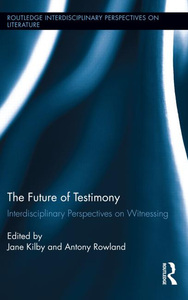Testimonial Modes: Witnessing, Evidence, and Testimony before the International Criminal Tribunal for the Former Yugoslavia
Campbell, Kirsten. 2014. Testimonial Modes: Witnessing, Evidence, and Testimony before the International Criminal Tribunal for the Former Yugoslavia. In: Antony Rowland and Jane Kilby, eds. The Future of Testimony: Interdisciplinary Perspectives on Witnessing. London and New York: Routledge, pp. 83-109. ISBN 9780415854450 [Book Section]
![[img]](https://research.gold.ac.uk/10391/1.hassmallThumbnailVersion/Book_Cover.jpg)
|
Image
Book_Cover.jpg - Cover Image Download (63kB) | Preview |
|
|
Text
Campbell Testimonial Modes.pdf - Accepted Version Available under License Creative Commons Attribution. Download (381kB) | Preview |
Abstract or Description
At the international level, criminal trials have been characterised as having two important – and sometimes conflicting – adjudicative functions. 3 First, international proceedings are characterised as mechanisms for finding fact and determining criminal responsibility, and so have a similar function to national criminal trials. Second, unlike national criminal trials, international trials are also perceived as having broader ‘transitional’ functions. The adjudicative functions range from establishing ‘historical facts’ of conflict to providing ‘rule of law’ principles for adjudicating conflict. 4 What role, then, does testimony play in establishing the ‘truth’ of international crimes? And how do international criminal trials
adjudicate the testimonial proof or disproof of such crimes?
|
Item Type: |
Book Section |
||||
| Departments, Centres and Research Units: |
Sociology |
||||
| Dates: |
|
||||
| Item ID: |
10391 |
||||
| Date Deposited: |
30 Jun 2014 09:36 |
||||
| Last Modified: |
09 Jul 2021 13:39 |
||||
|
URI: |
View statistics for this item...
 |
Edit Record (login required) |

 Tools
Tools Tools
Tools
